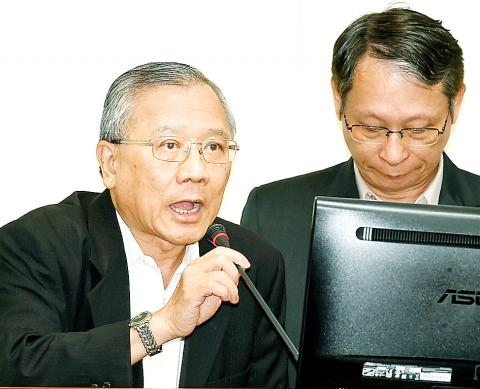CPC Corp, Taiwan (台灣中油) yesterday outlined provisions to compensate people affected by its substandard 95-octane unleaded gasoline containing unstable fuel additives.
The state-run refiner said motorists who had purchased the problematic fuel from gasoline stations operated by CPC or its franchisees from Oct. 1 to Saturday would be eligible for a full refund, adding that it would provide vouchers equivalent to the refund amount.
CPC chairman Tai Chein (戴謙) told lawmakers during a question-and-answer session at the Legislative Yuan’s Economics Committee that the compensation period would be extended by six months.

Photo: Fang Pin-chao, Taipei Times
The measure is expected to cost CPC more than NT$400 million (US$12.94 million), CPC said, citing estimates based on the 13,000 kiloliter of substandard gasoline that must be dealt with and at the latest fuel price of NT$31.5 per liter.
However, the incident’s total financial impact could be higher, as affected motorists are also eligible for reimbursements if the problematic gasoline had damaged their fuel tank sensors, although CPC said the problematic gasoline would not harm vehicle engines.
The refiner on Sunday said it would suspend sales of 95-octane unleaded gasoline at some of its stations in northern Taiwan, after gasoline supplied by its refinery in Taoyuan’s Gueishan District (龜山) failed to pass quality tests.
CPC found the substandard fuel stemmed from problems with fuel additives produced at the No. 2 catalytic reforming unit in the refinery.
As of 7pm yesterday, among the 102 affected gasoline stations in northern Taiwan, 55 had their fuel tanks filled with problem-free gasoline, while 47 were still awaiting remedy, CPC said.
Deputy Minister of Economic Affairs Tseng Wen-sheng (曾文生) has asked the refiner to submit a report on the incident before the end of this week.
Minister of Economic Affairs Shen Jong-chin (沈榮津) said that penalties resulting from the incident should aim at tightening lax protocols.

STEEP DECLINE: Yesterday’s drop was the third-steepest in its history, the steepest being Monday’s drop in the wake of the tariff announcement on Wednesday last week Taiwanese stocks continued their heavy sell-off yesterday, as concerns over US tariffs and unwinding of leveraged bets weighed on the market. The benchmark TAIEX plunged 1,068.19 points, or 5.79 percent, to 17,391.76, notching the biggest drop among Asian peers as it hit a 15-month low. The decline came even after the government on late Tuesday authorized the NT$500 billion (US$15.2 billion) National Stabilization Fund (國安基金) to step in to buoy the market amid investors’ worries over tariffs imposed by US President Donald Trump. Yesterday’s decline was the third-steepest in its history, trailing only the declines of 2,065.87 points on Monday and

TAKING STOCK: A Taiwanese cookware firm in Vietnam urged customers to assess inventory or place orders early so shipments can reach the US while tariffs are paused Taiwanese businesses in Vietnam are exploring alternatives after the White House imposed a 46 percent import duty on Vietnamese goods, following US President Donald Trump’s announcement of “reciprocal” tariffs on the US’ trading partners. Lo Shih-liang (羅世良), chairman of Brico Industry Co (裕茂工業), a Taiwanese company that manufactures cast iron cookware and stove components in Vietnam, said that more than 40 percent of his business was tied to the US market, describing the constant US policy shifts as an emotional roller coaster. “I work during the day and stay up all night watching the news. I’ve been following US news until 3am

Six years ago, LVMH’s billionaire CEO Bernard Arnault and US President Donald Trump cut the blue ribbon on a factory in rural Texas that would make designer handbags for Louis Vuitton, one of the world’s best-known luxury brands. However, since the high-profile opening, the factory has faced a host of problems limiting production, 11 former Louis Vuitton employees said. The site has consistently ranked among the worst-performing for Louis Vuitton globally, “significantly” underperforming other facilities, said three former Louis Vuitton workers and a senior industry source, who cited internal rankings shared with staff. The plant’s problems — which have not

TARIFF CONCERNS: The chipmaker cited global uncertainty from US tariffs and a weakening economic outlook, but said its Singapore expansion remains on track Vanguard International Semiconductor Corp (世界先進), a foundry service provider specializing in producing power management and display driver chips, yesterday withdrew its full-year revenue projection of moderate growth for this year, as escalating US tariff tensions raised uncertainty and concern about a potential economic recession. The Hsinchu-based chipmaker in February said revenues this year would grow mildly from last year based on improving supply chain inventory levels and market demand. At the time, it also anticipated gradual quarter revenue growth. However, the US’ sweeping tariff policy has upended the industry’s supply chains and weakened economic prospects for the world economy, it said. “Now